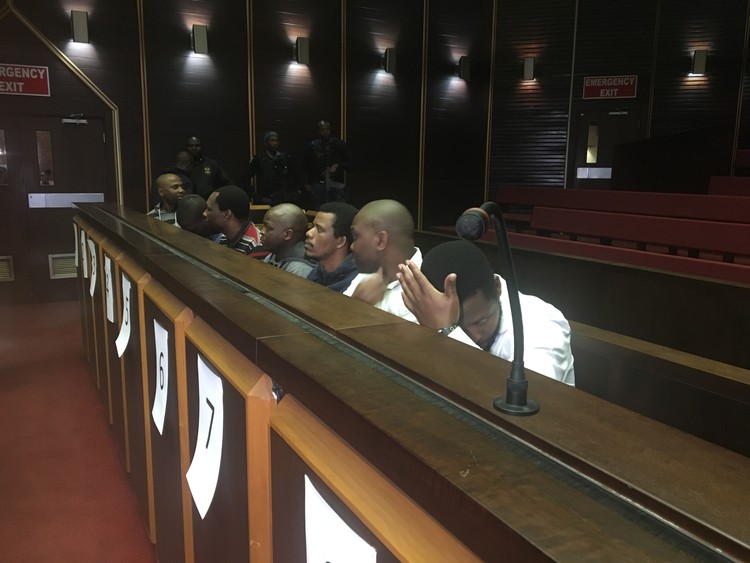
The accused face at least 22 charges, including nine for murder at the Glebelands hostels in Umlazi, Durban. They appeared in the Pietermaritzburg High Court on Wednesday. Photo: Nompendulo Ngubane
29 August 2019
The validity of a police officer’s evidence report was brought into question during the trial against the ‘Glebelands eight’ in the Pietermaritzburg High Court on Wednesday.
Mthokozisi Sishi, who works at the Local Criminal Record Centre in Durban, took the stand as the state’s first witness. He was testifying about evidence he collected after a shooting at Block R of Glebelands Hostel on 20 August 2014.
The accused are Bhekukwazi Mdweshu (who was a detective at the Durban Central police station), Khayelihle Mbuthuma, Vukani Mcombothi, Eugene Hlophe, Mbuyiselwa Mkhize, Ncomekile Ntshangase, Mondli Mthethwa and Bongani Mbhele.
They face at least 22 charges, including nine murder charges, seven for attempted murder, possession of illegal firearms, and racketeering. During a brief appearance on Tuesday, all of the men pleaded not guilty to all of the charges.
On Wednesday, Sishi was questioned about photographs and DNA samples he took of the attempted murder scene five years ago. It is the state’s case that the blood collected by Sishi from the crime scene that day, belonged to accused 1, Mdweshu, linking him to the shootings.
Sishi told the court that he was sent to Glebelands by the investigating officer to collect blood samples and take photographs of cars that were damaged during the shooting on 19 August 2014. He said he went to the scene a day after the shooting had taken place.
At the scene, Sishi said he took a blood sample from a plastic oil container. The sample was later sent for analysis at the police’s forensic department in Amanzimtoti.
But on cross examination, Martin Krog, who represents Mdweshu and Ntshangase, pointed out a discrepancy in an incident report done by a sergeant Themba Mnguni, which noted a different date for when Sishi had attended the scene.
“Mnguni said he went to the scene around 8:30pm shortly after the incident had happened and met Sishi [there] on 19 August. Mnguni said he arrived at the scene and found Sishi collecting gun cartridges,” said Krog.
In response, Sishi said that Mnguni must have been mistaken because he remembered visiting the scene a day after the shooting.
Krog questioned why Sishi had only focused on the blood sample found on the oil container and not other samples that were visible at the scene.
Sishi said he was merely acting on instructions at the time. “I went there to take pictures of the cars and was also told I should take a sample of the blood that was on the oil container. Usually the investigative officers tell us exactly what they need from the scene,” he said.
“The investigative officer told me that the blood on the container was from one of the victims and that I should take a sample of that blood,” said Sishi.
Krog also questioned the authenticity of the photo taken of the oil bottle, saying that it could have been taken anywhere. “It could have been taken in a field in Johannesburg,” he said. When questioned by Krog on why he had not noted the evidence in the case docket, Sishi admitted that he had made a mistake and “must have left that out”.
A second witness, Sthembisile Thabethe, recalled taking photographic evidence at separate evidence incidents that took place at Glebelands. The incidents involved three murders that took place in March, April and June 2015 at Block 57.
The case continues on Thursday.